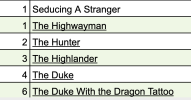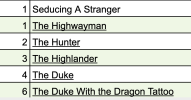The book follows Ben and Samantha, Ben is a survivor who was badly wounded in battle and has partially lost the use of his legs, one of his dreams is to dance. He walks around with canes, is in constant pain, but is also restless as he can't find his place and purpose in life, all he knows is he won't stay still as that would be admitting defeat.
Samantha is a recent widow, who is in mourning at the hands of an incredible depiction of a petty tyrant (her sister in law) who imprisons her by throwing propriety in her face constantly. Her husband died from wounds sustained during the war, his biggest loss was his beauty, their marriage was a sham and he had been cheating on her. Samantha did her duty for as long as he was alive and specially while he was convalescent, this exhausted her, and after a while, she started to grow restless.
They both meet by accident, but not really, they meet when Ben is riding a horse and as a way to push himself to live, and prove to himself that he was capable of pushing boundaries, he jumps a hedge and almost falls on her (and her dog, which is adorable). She is walking her dog as a way to defy her petty tyrant who would have not do nothing but stay home in a dark house whilst wearing black.
So they meet because they both pushed the boundaries of the freedom allowed to them by circumstance. Very adequate way.
After swearing and cursing, Ben felt guilty, sought to apologize to Samantha so he pays her a visit, during this visit she confesses to him that she wants to dance too. This is an important fact. After an invitation from him to her to go riding horses, her petty tyrant of a sister in-law, throws a tantrum, leaves her, tells on her to her father (samantha's father in law) who seeks to punish her by removing her from this place and having her live with him where he would, more or less, set her straight.
Samantha remembers she has a cottage somewhere in Wales, Ben offers to take here there. Along the way they admit their attraction, get to know one another, have an affair, fall in love and after her mourning period is over, they marry. Skipping a lot of details of course.
This story explored the idea of freedom, of running away from life, of libertine existence, of propriety and of pain.
They both clearly felt in shackles by their lives, him by his injury and her by her mourning period, though it is in her that the urgency to be free comes out stronger, Ben is a more grounded person, always considerate, finding a way for Samantha to be free while reserving some propriety to ensure she was safe.
That was rather interesting, he did not infringe on her freedom, the freedom she so desperately needed and wanted, but he still cared about her enough to find ways to explain their situation in a way that wouldn't hurt her, where her actions wouldn't simply look careless and she'd be the object of judgement. Even though she didn't realize how valuable this was.
This to me was contrasted against her petty tyrant, in both cases the idea of restricting some freedom for the sake of duty was present, but there's a subtle difference between setting boundaries to ensure success and simply restricting for the sake of restricting. Ben sought to do it for Samantha's sake, because in her urgency she didn't realize she needed some boundaries and restrictions. Her sister in law did it for her own sake, because she wanted to control Samantha's behavior.
And this is also explored in the idea of dancing, dancing isn't only moving around aimlessly for the sake of movement, it's a movement that is restricted by melody, rhythm and your partner. There's a proper way to be free, a gracious way that can create and expand on itself. There's the steps you learn to dance, to freely dance, but you ought to know the steps, otherwise you're not dancing, you're silly moving.
The title of the story is also interesting, and this happens to both of them, they're both escaping something. Samantha is escaping her confinement, the tyranny that she's lived with for 6 years and that her in laws were determined to keep her in, she's escaping shame of her past and the pain that living with her ex husband represented. Ben is escaping responsibility, he's allowed his brother to take control of his property, he's escaping admitting that he's injured, and they both do it in their own way.
She is rebellious and feisty about any restrictions, he's proud about being able to walk and tolerate pain. But then at some point, there's a conversation that illustrates a very important point. We bring ourselves wherever we go, we may all run away to Wales seeking to escape our lives, but we're not able to.
We may escape from the pain that was caused in a specific location, but we still bring the pain, we still bring the person that was hurt (or is hurting) we still bring the memories, and our reaction to them. We bring ourselves wherever we go, we carry our bags with us regardless of how far we run.
This made me think of how many times we live in addiction, or dissociation, or just busywork, just so that we don't have to look at our pain, just so that we don't have to carry our weight. Mary made Ben the illustration of how it can be dealt with.
At one point, when they reach Wales, and they set foot on the beach, they have a conversation, she mentions how the ocean is indtimidating, and he responds that staring at the ocean, at all that intimidating and scary vastness, can bring pain, but that also knowing the truth about our pain, not ignoring it (as he is unable to do so all his life) may bring one peace about it.
Her ex husband could not handle pain and eventually died, he simply could not find peace with his injuries. Ben on the other hand, took his pain as a challenge, accepted it and sought to move forward. It reminded me of what Aleta Edwards said about staring into the abyss, we will most certainly find pain and hurt, horror and regret when we look at that part of ourselves that we ignore constantly. but that is what is there, for better or for worse, it is what's there and that realization, brings peace and it's the first step towards healing or towards deciding about our existence.
She was running away from her pain, but she wasn't going to find peace until she stared at it, admitted how much everything that went on hurt her. How it hurt her to have been a game, a tool of her ex-husband to spite his father. And on that line how much it had hurt her that her family had all abandoned her in her childhood, something that made her feel alone.
At this point the idea of their affair is starting to take shape, she's pushing with her freedom towards "why not?" but he has a thought that I really liked. He realized, after getting to know her, that the one thing she had not had in her life was constancy of love, her father, mother, husband and in laws, everyone that she had ever relied on, trusted on, had abandoned her eventually. There was nothing constant in her life. And as such, he doubted going through with it, as it would have to be a short affair and he'd be essentially recreating the same dynamic, loving her for a week to only leave her afterwards. One more non-constant source of affection. That was beautiful, as this is when his care for her was starting to become very apparent.
Another lovely thought that was mentioned in this story, related to running away from pain, was from Samantha's grandfather, who had loved his first wife until she ran away, after this he became a drunk for years and his behavior led to Samantha's mother running away. He realized after all this that one will not be able to avoid pain when one loves another, but the one ought to love from a position of strength, and not only strength but from a position of wholeness. This idea of loving from a position of wholeness was rather incredible.
If one is whole when one loves, one can offer oneself fully to that person, and when the inevitable pain of life comes, one will be able to remain whole, bruised, beaten and crushed, but whole. So that pain may not destroy the love, or the lover in the process. One ought to make the love one feels for someone, and the one received by that person, or the universe, something that expands one's existence into being part of something larger, not something that comes to fill voids within.
Not that one ought to be independent within a relationship, or that things like affection, or reassurances don't have a place, we will always have insecurities, but even admitting these insecurities (staring at the sea) which are part of one's wholeness, should be made conscious so that pain won't entirely break us when it rears its head in our lives.
Overall, this was a lovely story, I think it explored several concepts of freedom, pain... constant pain, purpose, tenacity, humility (as by the end Ben finally admits he's not like everyone else and accepts a wheel chair, thus gaining mobility!) And most interestingly, the purpose of liberty.
Not just freedom and libertine behavior, because you live only once and so you should do whatever pleases you, but of liberty, which grants the same freedom, but carries with it the recognition of responsibility, of boundaries, of limitations, which aren't incompatible concepts.
This idea was beautifully illustrated at the end, when they do finally get to dance, but in order to be able to do it, they had to find their own little place and their own specific pose that allowed them both to dance with one another. By accepting a limitation, they found their way to be free from what was holding them back, without actually running away from themselves.






